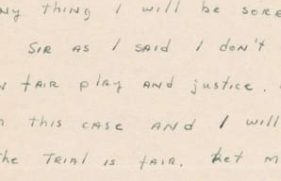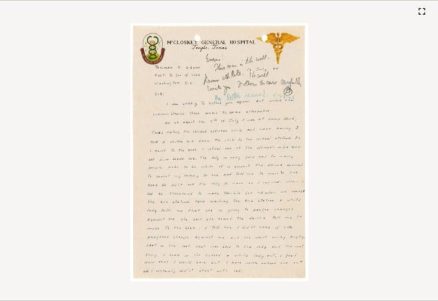
Letter from Lt. Jack Robinson to Truman K. Gibson
The Great Depression and World War II (1929-1945)
A National Archives Foundation educational resource using primary sources from the National Archives

Published By:
Historical Era:
Thinking Skill:
Bloom’s Taxonomy:
Grade Level:
This activity can be used during a unit on civil rights, segregation, or World War II. For grades 7-12. Approximate time needed is 30 minutes. Students can work individually, in pairs, or in small groups.
Direct students to the activity and ask them to carefully read the document and answer the questions that follow.
After students have answered all of the analysis questions, they should click on “When You’re Done.” Facilitate a class discussion based on the questions:
If your class is not familiar with Jackie Robinson’s life and career, provide the following biographical information as needed:
In 1947, Jackie Robinson broke Major League Baseball’s (MLB) “color barrier” when he started his rookie season with the Brooklyn Dodgers. He was the first Black man to play in the MLB in the 20th century. (A player named Moses Fleetwood Walker became the first Black man to play major-league baseball in 1884.) When Robinson joined the Dodgers, all the other players in Major League Baseball were white. Because of his race, Robinson was the target of racial abuse and discrimination. But Robinson played the best baseball he could, even as fans yelled insults at him and the entire nation focused its attention on his game. In the course of a distinguished 10-year career, Robinson led the Brooklyn Dodgers to six National League titles and one victorious World Series. In 1962 he was elected to the Baseball Hall of Fame. Beyond his many and stellar baseball feats, Jackie Robinson went on to champion the cause of civil rights when he retired from the game. He attended the March on Washington and wrote letters to presidents and government officials.
Robinson had been drafted into the Army during the second World War and commissioned as a second lieutenant in 1943. When Robinson wrote this letter in 1944, he was stationed at Camp Hood, Texas (later named Fort Hood), which maintained complete segregation and whose surrounding community had a reputation for discrimination and racism. (Read additional information about this letter; this information is hidden from students during the activity.)
In this activity, students will analyze a letter written by Jackie Robinson when he was in the Army in Texas in 1944. It describes a racially-charged incident for which he was court-martialed on what he considered trumped-up charges (he was ultimately acquitted). After analyzing the document, students will reflect on the impact of this event in Robinson’s life prior to breaking the color barrier in major-league baseball and his civil rights activism following his retirement from baseball.
